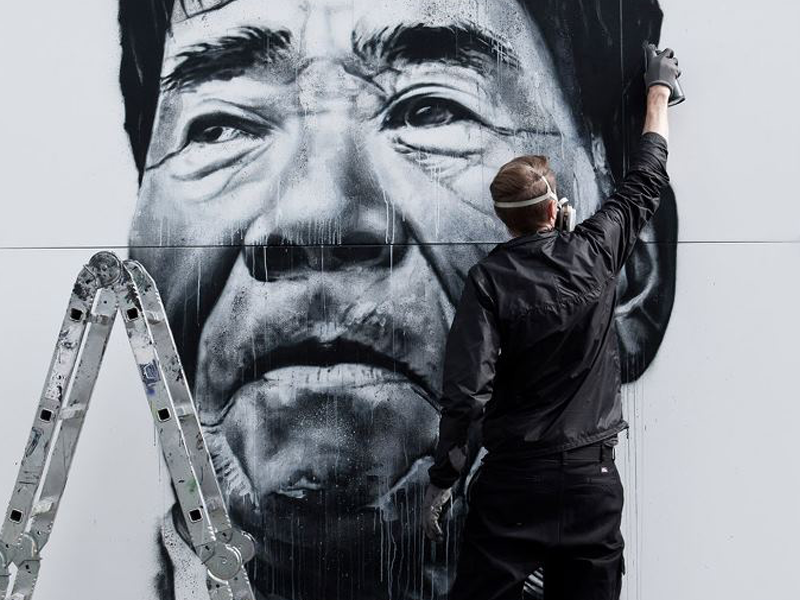
Becoming a Storyteller: How to Cultivate Your Writing Skills
Taras Prokhasko
Writer, translator, essayist
On the desire to preserve the passing days in texts, the role of constant practice in writing and the need to broaden one’s horizons
Writers, just like athletes, come in all shapes and forms. And it’s not just about their styles and interests, but also about their motivation – what makes them write? There is a whole system of such reasons. Personally, I felt the transience of everything around me and I felt like putting it down on paper. Another main motive for me is attempting to translate the life that goes by into a life in language, and by that same token preserve it. But there is an urge that unites all possible motives: the desire to tell people a story. This is the basis of it all for everybody who writes. From the desire to tell a story about what you know, about what troubles you or makes you happy, all literature is born.
The most important thing for an author is not his own experiences, but reflection. Even a seemingly insignificant or banal experience, when it has been deliberated and certain representations are built on it, can become valuable. What matters in literature is working with experiences, rather than collecting them. But, of course, every experience, even if it does not feed into literary material, is still an expansion of one’s horizons. And this is very good, because it makes it possible to show even ordinary things on a different scale.
I have had many such experiences. And even if I do not write about them, they have taught me a lot. For example, for a while I worked as a bartender. And besides the stories I heard from visitors daily behind the counter, I realised how important communication was. Not in the modern sense – strategies of proper behaviour – but simply different manifestations of interaction. I also realised how you can serve with dignity, how this can bring joy and not humiliation, how not to bring your own stereotypes and complexes to your place of work.
Similarly, my army experience was very important for me. I was a domestic child from Western Ukraine, from the intelligentsia, and the army opened a new horizon for me. And no matter how drawn you are to go back to your nest, it is important to understand that there are completely different manifestations and forms of life around. A great school for me was my experience of becoming a father. And now, taking walks with my baby for hours every day, I get to look in a new way at the different corners of the city and scenes of urban life. And it was a long time since I was able to observe this, having been living at a different pace.
The most valuable advice that I received was from Yurii Andrukhovych: “It is not that important what you write about. What matters is that it is beautifully written.” When it comes to literature, it is not about the stories, but rather how they are told. Literature is not a shorthand of facts. That is why it is important to think not about how it really happened, and even not about how you feel about it. But take as a starting point the fact that each text is the creation of a new reality. And when it vibrates in somebody, this is the good effect of literature. And different things can leave a mark on the reader: the narrative itself, its rhythm, well-chosen words.
A clearly defined beginning and end are one of the greatest features of literature and art. And this is the most unreal thing because in real life they are really difficult to find. Therefore, the author should know well what happened before the beginning and what will happen after the completion of this work. The text must be cut out as accurately as possible from this stream of perpetuity.
Even when I write columns on current events, I want to show that this is not a torn fragment of history. It is a process that has long started and will continue for a long time to come, even when we do not reckon with it. What we notice is only a small knot on a long rope. And you need to feel the rope a little bit further back, and, perhaps, a little bit further ahead, otherwise you will not be able to undo this knot.
The method of writing greatly depends on the specific psyche of the author, so it’s hard to talk about a standard. It is known that literature is in a sense therapy, it is a way to make your stay in this world easier. But, depending on the specific personality of one author or another, writing may be associated with suffering, self-flagellation, or it can be light and joyful, in a way that excites the author himself.
It can also be both in the same person, depending on what it describes. At times, knowing that this text will be painful for me, I put it off and preferred not to write it. And in one of my earlier works I wrote: “This story should be written with ease and joy, so it can be read with as much ease.” I believe that this state of mind of the author is passed on to the reader.
There are no “requirements” in literature. When it comes to practice, this is rather the author’s inner work, his desire to turn writing into a strategy for his spiritual growth. Of course, one cannot write well without practice, it is necessary, although it can be very different. Just like those Japanese who practice martial arts for several hours every day. Or like the Americans or Europeans, who go once a week to a yoga centre, and the rest of the time lead a life that negates their training.
Of course, there are cases when even in spite of daily practice people cannot go beyond the boundaries of their limitations and achieve the desired results. Although certain skills are equally polished. Personally, I feel it is important for me to feel progress. But I cannot say that this is a curve that grows from quality. It is more about evolution, when there are changes, innovations, new techniques, when new motives appear. I like diversity, and this pushes me not to stick to the same thing, even if it is a very successful template. Writing should sometimes be allowed to grow uncontrollably, just like grass and trees.
If you are beginning as a writer, we recommend that you think about monetising your work and about the opportunities for growth. Here are some tips:
1. Build your personal brand in social media, work on a portfolio and develop your network of contacts (with colleagues, publishers, literary agents).
2. Take part in residencies for writers. This way you will get a creative environment, experienced mentors and valuable time that you can devote to writing, as all living expenses are usually reimbursed by the organisers. Also, you will be able to immerse yourself in the unique atmosphere at the location. You can find updated residencies from around the world here, and don’t forget about Ukrainian ones, especially Stanislavskiy Fenomen and Carpathian Literary Residency.
3. Apply for grants. Usually they have a specific goal: for example, investigate the history and intercultural ties of a certain region. But make no mistake, brilliant ideas often come up in response to the requests of grantors.
You can find many opportunities on the Culture and Creativity Programme's website. Furthermore, monitor grants from around the world here and watch out for various opportunities on platfor.ma and biggggidea.
4. Don’t stop growing. Attend lectures on literature offered by the Cultural Project, course on writing from the Centre of Literary Education in Kyiv, Kharkiv and Lviv, watch video lectures from Wisecow. In addition, do not forget about the online courses on writing and literary criticism from Edx, Coursera, Future Learn and other Western educational resources. For example, Khan Academy has, incidentally, released a storytelling course from Pixar Animation Studios.
5. Don’t procrastinate. You can stimulate your productivity on special online resources. This one, for example, will begin to delete all the words you type in once you stop typing.
6. Do you believe that your book is sure to be of interest to readers? You should be able to prove it to a wide audience. Use crowdfunding platforms to mobilise those around you. Some authors get funds to publish their works on crowdfunding platforms, such as Kickstarter, Indiegogo, or the Ukrainian Spilnokoshti.
For activists in the cultural and creative industries, a series of online courses has been developed with European experts on strategic planning, advocacy, project proposal writing, and much more.
The article was drawn up in cooperation with the EU-Eastern Partnership Culture and Creativity




